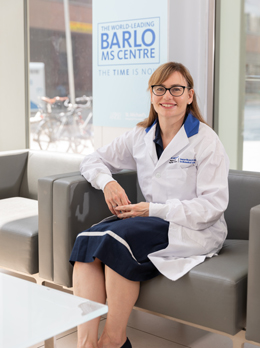New Keenan Research Centre scientist seeks to uncover causes of MS: the disease that changed her childhood

By Ana Gajic

Dr. Shannon Dunn
When Dr. Shannon Dunn was two years old, her mother was diagnosed with multiple sclerosis (MS).
“Her experience, though very difficult to witness, was a source of inspiration,” Dr. Dunn says. “It made me feel I had no legitimate reason to give up on anything.”
Now, Dr. Dunn is a recently recruited researcher in the Keenan Research Centre for Biomedical Science (KRCBS) and is committed to understanding the science behind the disease that shaped her family’s life.
MS affects one in every 385 Canadians. Most often, the disease strikes people in their 20s and 30s, affecting young women more than men. It degenerates the central nervous system, damaging nerves’ protective layering and affecting their ability to control the body’s actions. There are treatments that slow the progression of MS, but there is no known cure. Also, very little is understood of the triggers of the disease.
That’s where Dr. Dunn’s research comes in.
She is focused on what causes MS and why certain risk factors seem to be associated with the disease. For example, she looks at the reasons behind why women get MS more often than men do and why childhood obesity is linked with MS. She models these risk factors in lab models of MS and studies the mechanisms of how these factors alter progression of disease in these models.
“The ultimate goal will be to identify the early biomarkers for MS and somehow treat people before they even know they have symptoms,” says Dr. Dunn.
She started out her research career in skeletomuscular physiology, conducting graduate studies in this area. With her mom in mind and after seeing the field of research in MS grow, she shifted gears to focus on MS and completed her post-doctoral training at Stanford University. Most recently, she was a scientist at the University Health Network.
Dr. Dunn’s move to the KRCBS at St. Michael’s was propelled by the hospital’s focus on MS treatment and research. With more than 8,000 patients receiving care at the St. Michael’s clinic and a team dedicated to delivering world-class specialty care to MS patients, the hospital is one of North America’s largest and leading MS centres.
Her position is supported through the St. Michael’s Hospital Foundation’s $40-million ‘THE TIME IS NOW’ campaign, which is raising funds to build the world-leading BARLO MS Centre, and to recruit and bolster top talent.
“The potential of research is huge and we can alter the prognosis of MS by influencing different aspects of the disease,” says Dr. Xavier Montalban, neurologist and director of the new BARLO MS Centre at St. Michael’s, which is currently under construction.
“Through immunological studies with clinical data and basic science, research to understand the mechanisms that cause MS to progress, and studies of patient-reported outcomes, we have the potential to change the course of MS.”
Within her lifetime, Dr. Dunn has witnessed the changing face of MS.
“What my mother went through wouldn’t happen today,” she says, “She progressed rapidly because there were no treatments. “Today we have treatments that prevent attacks even in those with an aggressive course.
“My hope is that, by working as a team at St. Michael’s, we’ll be able to contribute to more options for people diagnosed in the future.”
Until then, her mother’s journey with MS continues to motivate Dr. Dunn.
“She never complained and never gave up. And I don’t give up either.”
About St. Michael’s Hospital
St. Michael’s Hospital provides compassionate care to all who enter its doors. The hospital also provides outstanding medical education to future health care professionals in more than 27 academic disciplines. Critical care and trauma, heart disease, neurosurgery, diabetes, cancer care, care of the homeless and global health are among the Hospital’s recognized areas of expertise. Through the Keenan Research Centre and the Li Ka Shing International Healthcare Education Centre, which make up the Li Ka Shing Knowledge Institute, research and education at St. Michael’s Hospital are recognized and make an impact around the world. Founded in 1892, the hospital is fully affiliated with the University of Toronto.
About Unity Health Toronto
Unity Health Toronto, comprised of Providence Healthcare, St. Joseph’s Health Centre and St. Michael’s Hospital, works to advance the health of everyone in our urban communities and beyond. Our health network serves patients, residents and clients across the full spectrum of care, spanning primary care, secondary community care, tertiary and quaternary care services to post-acute through rehabilitation, palliative care and long-term care, while investing in world-class research and education. For more information, visit www.unityhealth.to.
